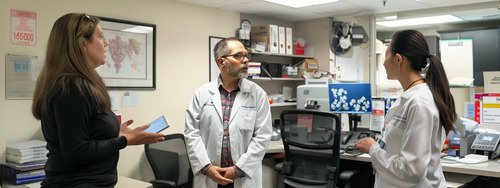
An associate’s degree in public health can be the cornerstone for a rewarding career in the health sector. With an emphasis on community wellness, disease prevention, and health promotion, graduates are equipped with a fundamental understanding of public health principles. As healthcare demands continue to rise, so too does the demand for skilled public health professionals. Whether in government agencies, non-profits, or private sector establishments, opportunities abound for those with the right qualifications. Below, we explore various career options, skills required, and potential growth opportunities for those with an associate’s degree in public health.
Exploring Public Health Career Paths for Associate Degree Holders
An associate’s degree in public health can lead to various entry-level positions within the healthcare system, including health educators, environmental health technicians, and program assistants. The degree also provides a foundation for specialized roles in data management and health informatics, enabling public health associates to assist in collecting and analyzing health data to inform community health strategies and policies.
They can also work in NGOs and international health initiatives, focusing on project coordination, community outreach, and educational campaigns. Public health associates can also pursue careers in the governmental sector, contributing to policy development, program implementation, and emergency preparedness activities, serving as critical links between the healthcare system and the communities they serve.
Essential Skills for Public Health Associate Degree Graduates
Public health graduates need a comprehensive skill set to navigate the healthcare field effectively. Core competencies include understanding epidemiology, biostatistics, strong communication, and cultural competency. They must be able to track disease patterns, identify health risks, and interpret data to guide decisions.
Communication skills are crucial for conveying complex health information to diverse audiences. Problem-solving and critical thinking are essential for navigating the logistical and ethical complexities of public health programs. They must evaluate health programs and policies for efficacy and fairness. Knowledge of health policy and administration is essential for those interested in systemic aspects of public health, allowing them to shape health systems and ensure the efficient operation of health programs and services.
Public Health Technician: A Gateway to the Healthcare Industry
Public health technicians are essential professionals in the field of disease prevention, conducting tests and collecting data to inform community health initiatives. They monitor environmental hazards, track communicable diseases, and support public health investigations.
Technicians use technical skills to analyze samples and contribute to research, ensuring accuracy and attention to detail. They communicate with healthcare professionals and policymakers to report findings and make recommendations. Specializations in areas like water quality, vector control, or health education can align professional goals with personal interests. Technicians may pursue additional certifications and training to enhance their expertise and career advancement.
The Role of Community Health Workers in Public Health
Community health workers (CHWs) are graduates with an associate degree in public health who act as liaisons between health services and the community, often advocating for underserved or marginalized populations. They focus on outreach, advocacy, and education to promote health within their communities.
CHWs conduct home visits, organize community programs, and work with healthcare providers to help individuals navigate healthcare systems. They also provide culturally sensitive health education and empower individuals by offering resources and support for managing health issues. CHWs also gather community health concerns to inform health planners and policymakers, ensuring public health strategies are responsive to community needs.
Transitioning From an Associate Degree to a Bachelor’s in Public Health
Earning an associate’s in public health online is a great starting point for those pursuing a career in health. Many use it as a stepping stone toward a bachelor’s degree, which opens doors to higher-level roles like program management, policy development, and specialized areas such as global health or public health law.
Bachelor’s programs often build on prior learning, making the transition smooth. With flexible online options, working professionals can continue gaining experience while expanding their knowledge in both science and social aspects of health, boosting their qualifications for advancement.
Overall, an associate’s degree in public health lays the groundwork for numerous career paths. It empowers graduates with the skills and knowledge critical for entry-level positions while also providing a platform for continuing education and advancement. Whether aiming for an immediate career start or planning for further academic pursuits, a solid foundation in public health sets individuals on a path to make meaningful contributions to the health and wellness of communities.





